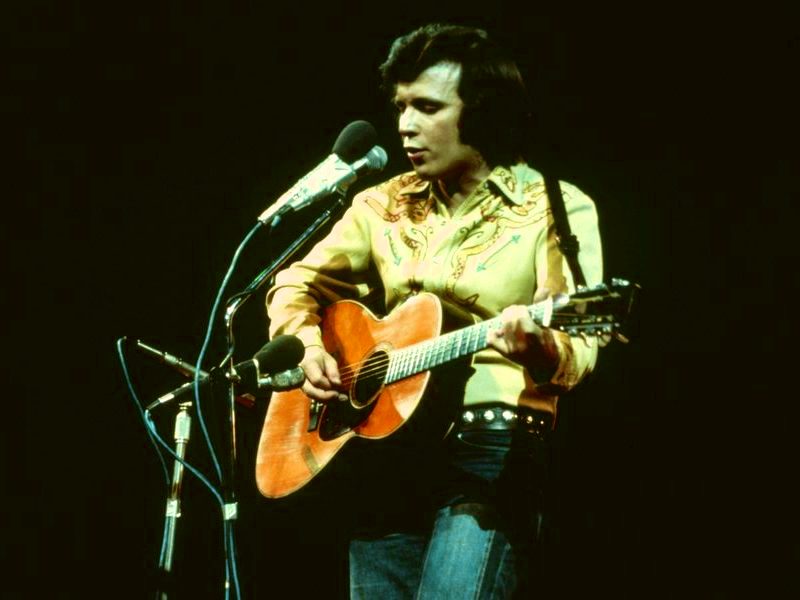Now streaming on Paramount+ is The Day The Music Died: The Story Of Don McLean’s 'American Pie.' The film, which was directed by Mark Moormann and produced and spearheaded by music veteran, Spencer Proffer, features McLean throughout the film discussing both his artistic journey and the creation and life of the famed rock standard.
On January 15th, 1972, “American Pie” topped the Billboard Hot 100 chart for the first week of its month-long run. The song is the origin of the term “the day the music died,” about the February 1959 plane crash that killed Buddy Holly, Ritchie Valens, and J.P. “The Big Bopper” Richardson, but that's only a small part of what it's about.
Appearing in the film are Brian Wilson, Garth Brooks, “Weird Al” Yankovic, bassist Rob Stoner, and actor Peter Gallagher — who voices the children's book Don McLean’s American Pie: A Fable. In one of the more memorable moments of the film, Ritchie Valens' sister Irma meets with Don McLean prior to his performance at Clear Lake, Iowa's Surf Ballroom while paying tribute to her brother, Buddy Holly, and J.P. “The Big Bopper” Richardson at the last venue they performed at before the tragic plane crash.
The Day The Music Died also spotlights how “American Pie” has crossed not only musical genres but entire cultures, with session footage of Maffio recording a new Spanish/English version of “American Pie.”
Don McLean was a huge Buddy Holly fan growing up, and he was deeply moved by Holly's death, but says that it's merely the starting off point of what “American Pie” is about: “The fact that Buddy Holly seems to be the primary thing that people talk about when they talk about 'American Pie' is, is kind of sad. It's only the beginning is about Buddy Holly, and the rest of it goes on and talks about America and politics and the country, and trying to catch some kind of a special feeling that I had about my country, especially in 1970 and '71, when it was very turbulent.”
Although Buddy Holly only plays a small role in the song's story, McLean is still proud that “American Pie” had a lot to do with the latter-day interest in Holly and his music: “The event became an enormous thing, if I may say so, with all due respect to myself, because of the song 'American Pie.' If you talk to (author) John Goldrosen, who wrote the book about Buddy Holly, nobody was interested in him — no one wanted the book that he wrote, which ended up being able to be published because of my song. If you talk to (Holly's wife) Maria Elena, they will tell you that Buddy got more publicity after I wrote my song than he'd ever gotten in his life. So, that's just the way it was. I know it sounds self-serving, but if you check it out, you will find that out, and that started the whole thing going.”
McLean says when he was writing and recording “American Pie,” he had no idea it would become a massive hit — but he did know the song was something special: “It was a tremendous lot of fun to try and do it. I enjoyed it. I felt like I was creating some sort of an invention in the basement, or some magic chemical compound or something. And I was sure that it was just what I wanted it be, as a song and as a record.”
The story of “American Pie” has become the stuff of legend, with many believing it's almost a history of rock n' roll — there are even web pages devoted to scrutinizing every line and word. Until the new doc, McLean himself has never revealed any true meanings behind the song, because he says that would spoil the fun: “Truly and honestly. I don't talk about the song because, it is supposed to be like a dream. And y'know how it is when you have a dream, a table can become a beautiful woman, or a window, you can suddenly see yourself looking out of it and then you're flying over the city, or something. You know what I mean? There is no explanation for a dream.”
Producer Spencer Proffer shed light the doc returning to Clear Lake, Iowa: “One of my favorite movies was Field Of Dreams and that happened in Iowa. And the field happened to be the field that the plane crashed in — very close by it. It's adjacent to the Surf Ballroom. And the story of how that place took off and how it crashed is in the doc. Don McLean, to his credit, decided that they would do a pilgrimage back to where it happened. To pay tribute to the fact that this is where these guys died and it was a seminal moment. It took 'the day the music died' from what it was until what the music became.”












